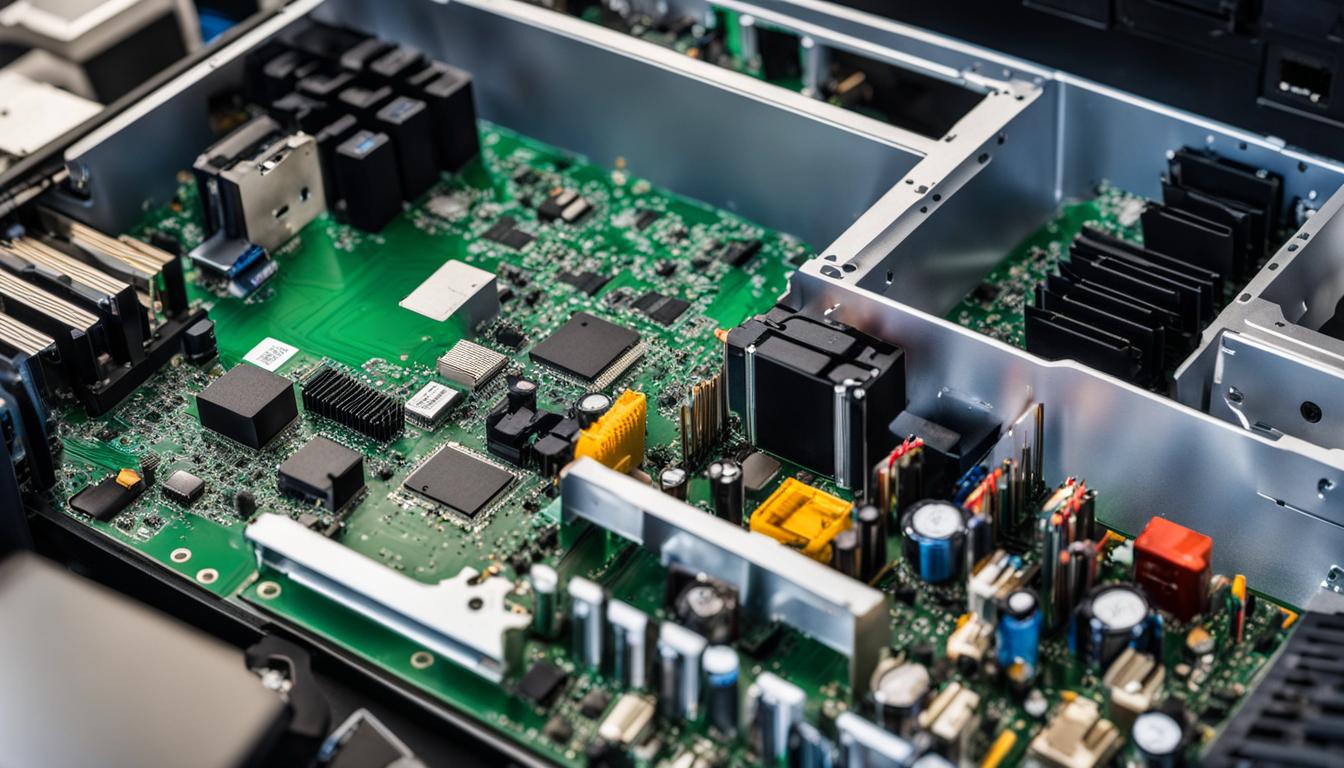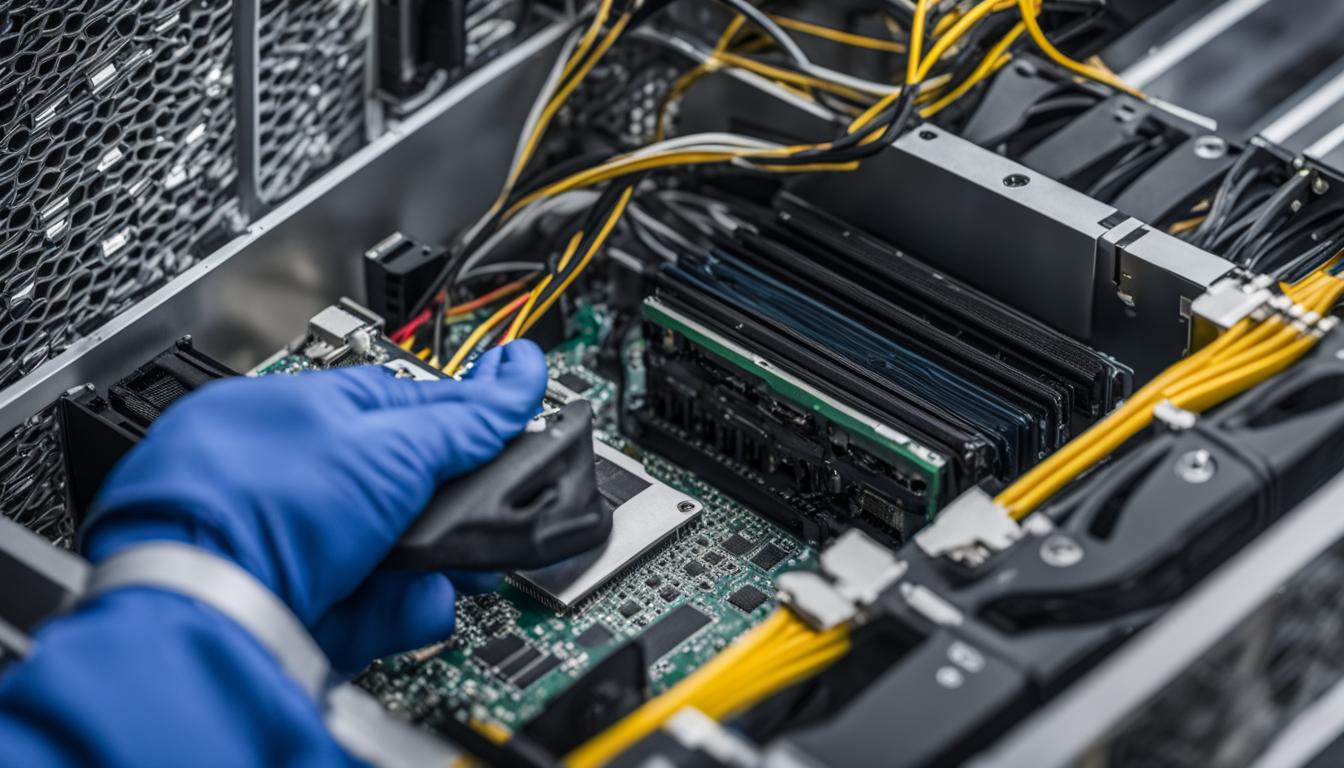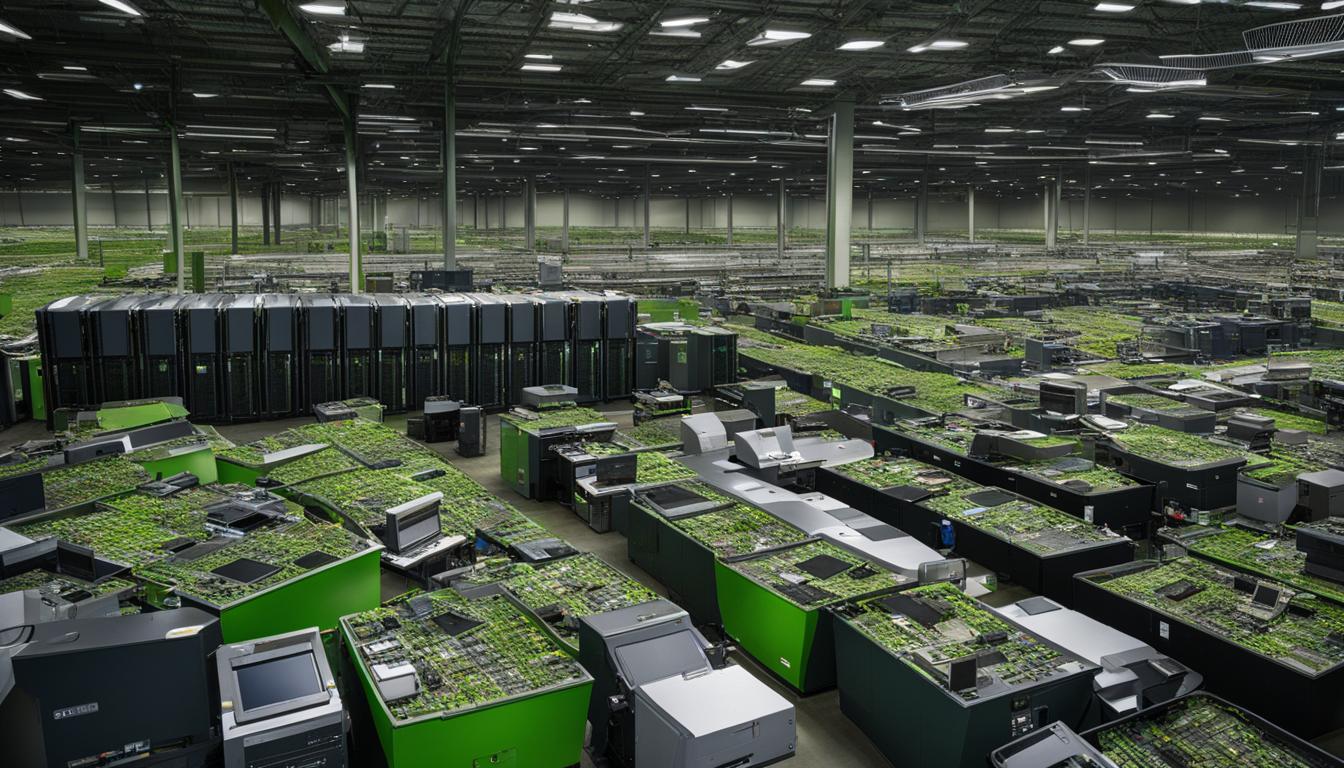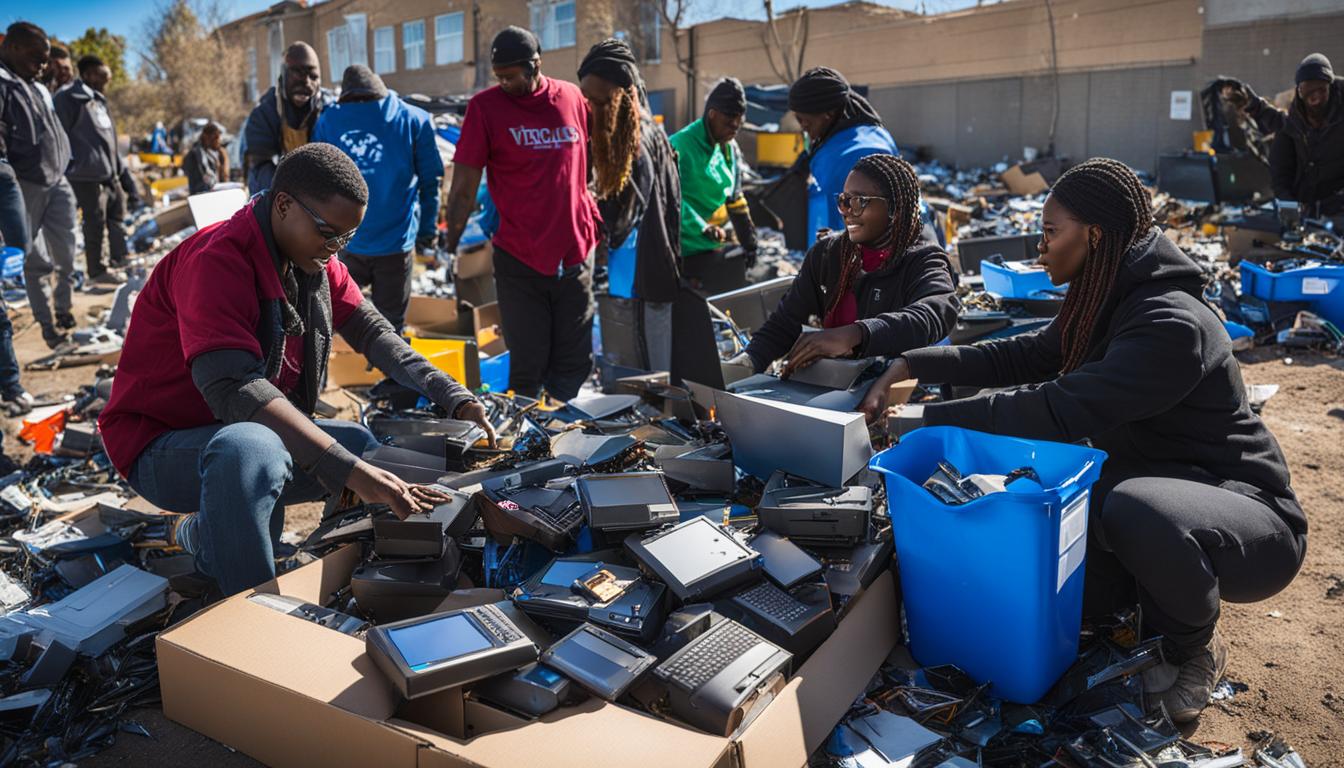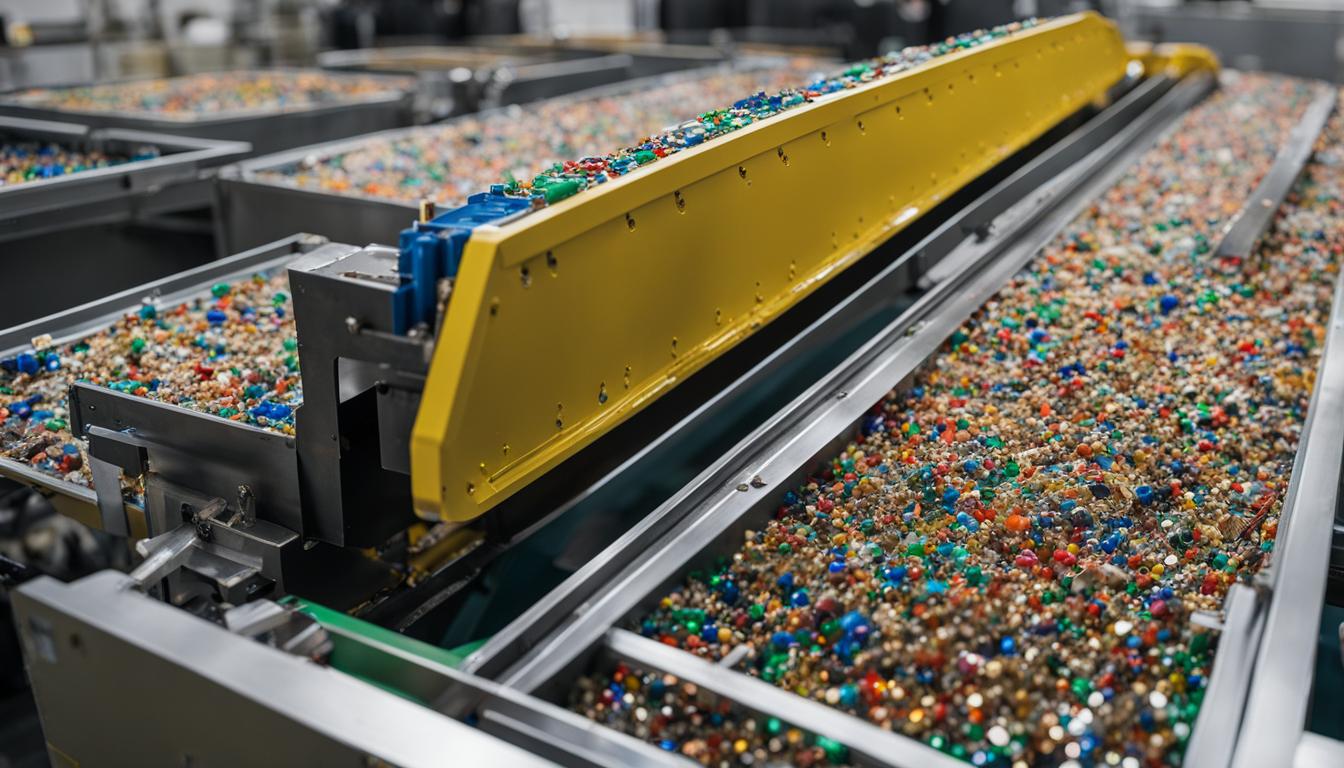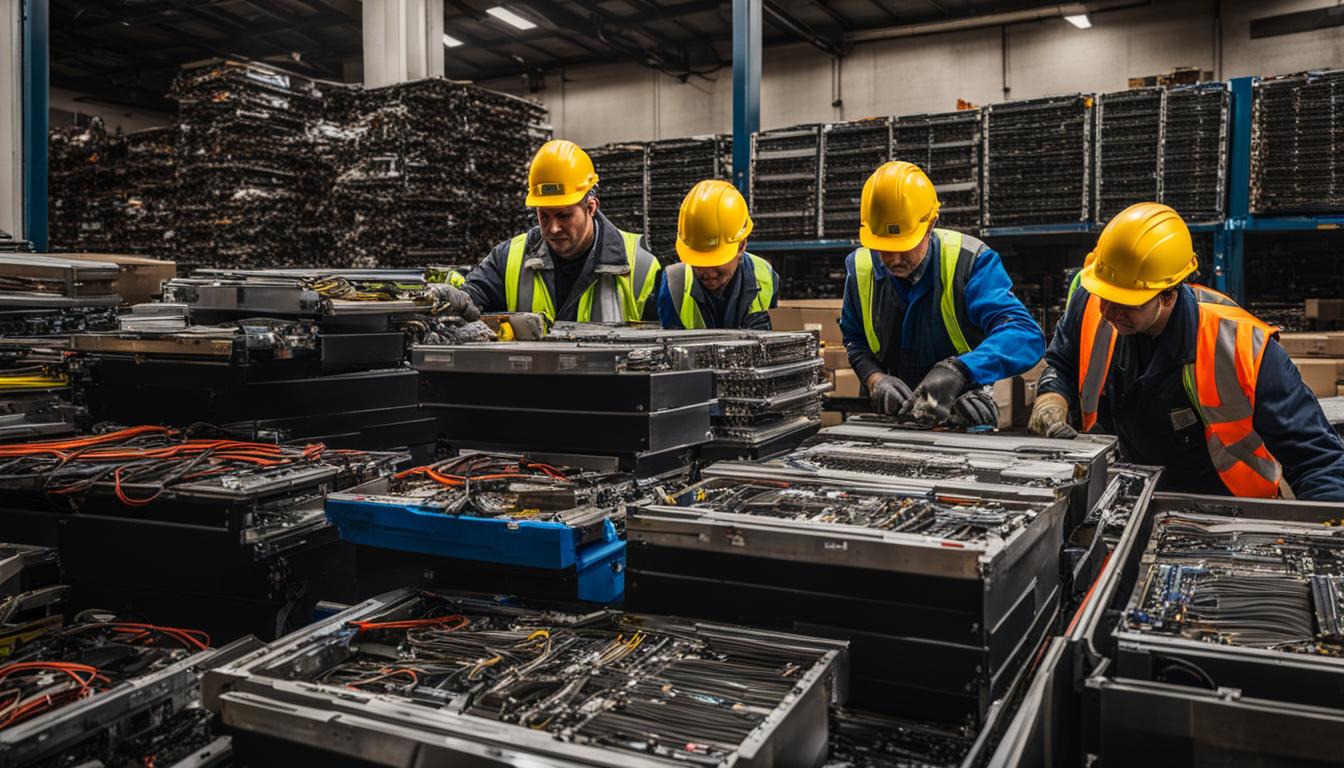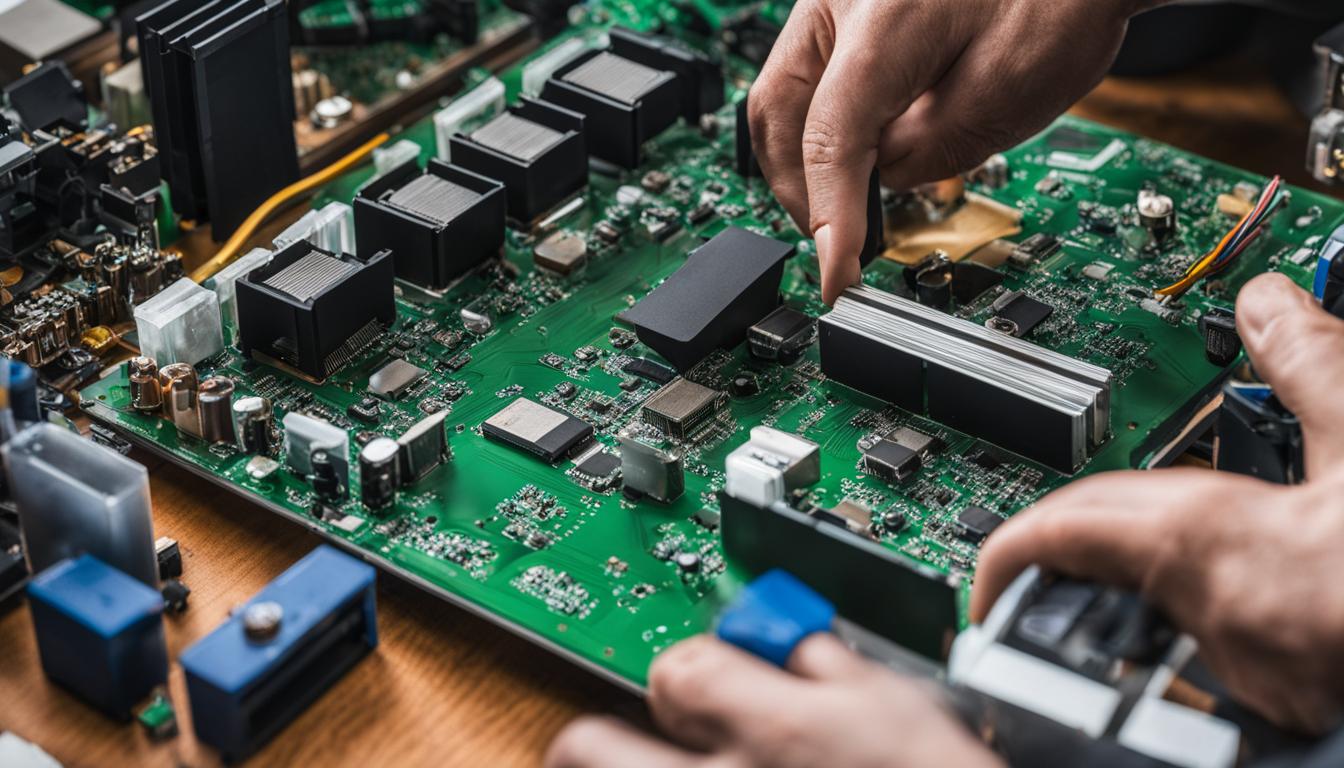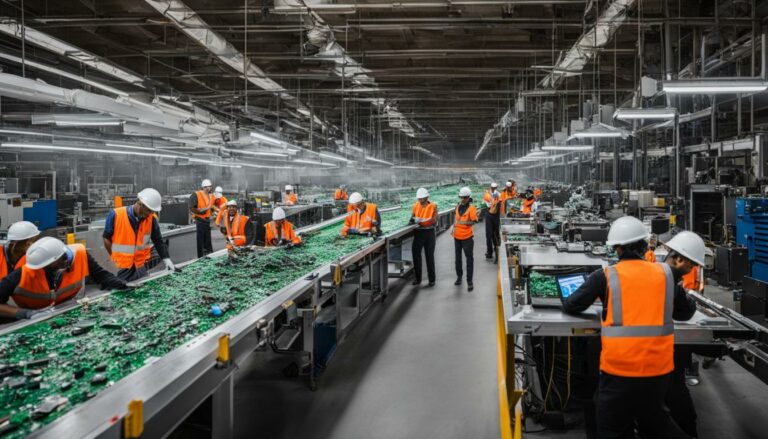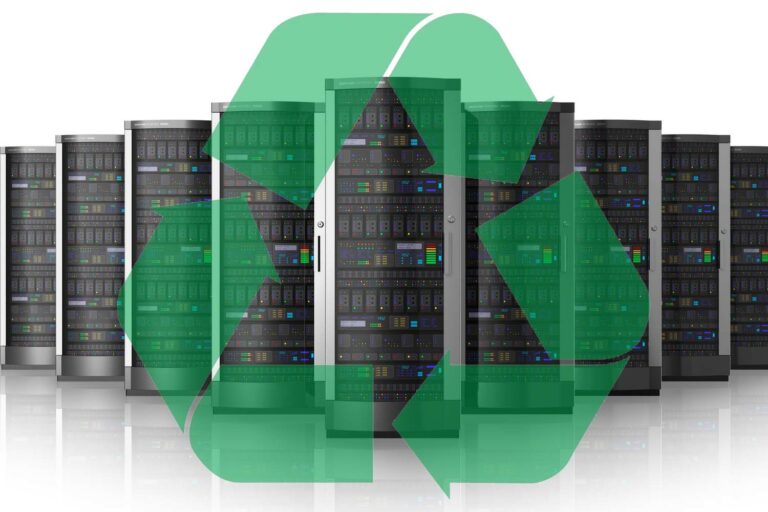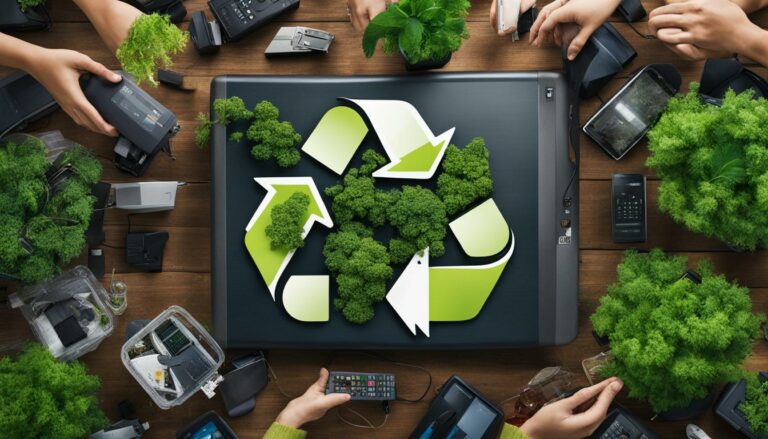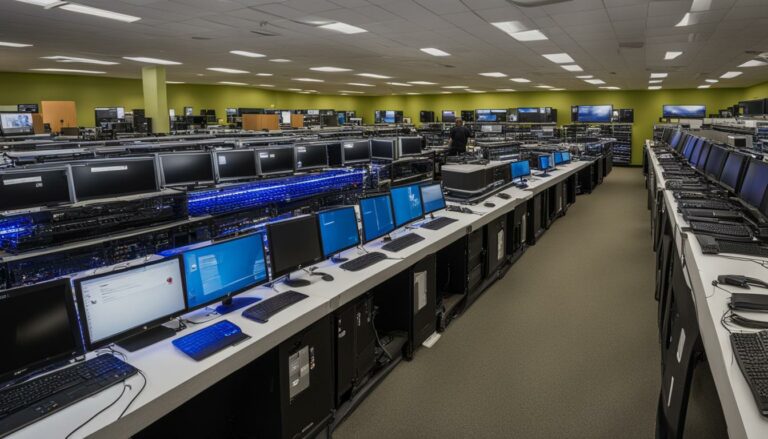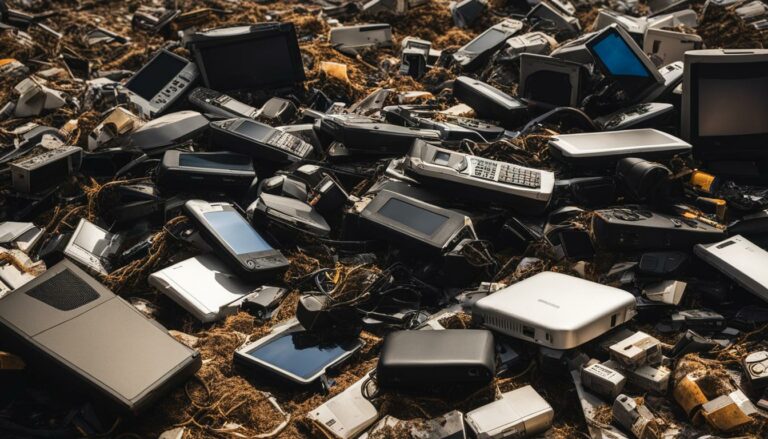Server Parts: What’s Recyclable and What’s Not?
Server recycling is a crucial step in ensuring the safety and sustainability of your IT department. Disposing of servers without proper care can pose a threat to the environment due to the toxic elements present in their components. Recycling servers helps reduce electronic waste and prevents the leakage of harmful substances into the environment. It is crucial to choose a reliable recycling company that follows proper procedures for dismantling server hardware and securely disposing of data-containing components. Recycling servers not only protects the environment but also safeguards your data security.
Key Takeaways:
- Server recycling is essential for minimizing environmental impact and reducing electronic waste.
- Choosing a reputable recycling company is crucial for proper server disposal.
- Data security should be a priority when recycling server components.
- Recycling servers helps recover valuable materials and reduces the need for extracting new resources.
- By prioritizing server recycling, businesses can contribute to a greener IT infrastructure.
Why Server Recycling is Important for the Environment
Recycling server components is essential for the protection of the environment and the promotion of sustainable practices in the IT industry. When servers are disposed of without proper recycling, they often end up in landfills, which poses a significant threat to the environment. Servers contain toxic elements such as cadmium, beryllium, and mercury, which can contaminate groundwater and soil if not handled responsibly. By recycling server components, we can prevent these harmful substances from entering the ecosystem and reduce the overall environmental impact of electronic waste.
Another important reason for server recycling is the recovery of valuable materials. Servers contain various components, such as circuit boards, processors, and memory modules, which can be extracted and reused in the manufacturing of new electronic devices. By recycling these components, we can reduce the need for extracting raw resources from the environment, conserving energy and reducing the carbon footprint associated with resource extraction and manufacturing processes.
Through server recycling, we can also contribute to a greener future by minimizing electronic waste. Electronic waste has become a global issue, with millions of tons of discarded electronics being generated every year. By recycling servers and other electronic devices, we can divert a significant amount of waste from landfills and ensure that valuable materials are put back into the production cycle. This reduces the demand for new electronics, conserves resources, and promotes a more sustainable approach to IT infrastructure.
Benefits of Server Recycling:
- Prevention of toxic substance leakage into the environment
- Recovery and reuse of valuable materials
- Reduction of electronic waste
- Conservation of resources and energy
- Promotion of sustainable practices
Server recycling plays a vital role in safeguarding the environment and ensuring a more sustainable future for the IT industry. By partnering with reliable recycling companies and promoting responsible server disposal practices, businesses can contribute to the reduction of electronic waste and protect the planet for future generations.
| Types of Server Components | Recyclable | Non-Recyclable |
|---|---|---|
| Hard Drives | ✓ | |
| Power Supplies | ✓ | |
| Memory Modules | ✓ | |
| Circuit Boards | ✓ | |
| Processors | ✓ | |
| Plastic Casings | ✓ | |
| Batteries | ✓ | |
| Cooling Fans | ✓ | |
| Optical Drives | ✓ | |
| Other Electronic Components | ✓ | |
| Server Chassis | ✓ |
The Process of Server Recycling
Server recycling involves several steps to ensure the safe and efficient disposal of server components. The process typically includes waste removal and collection, where the servers are collected from different sources. Then, the recycling company separates and dismantles the components, extracting valuable materials for reuse. Data destruction is also a crucial part of the process, ensuring that sensitive information is securely destroyed before recycling. It is important to choose a reputable recycling company that follows strict guidelines for safe and compliant server recycling.
Here is an overview of the server recycling process:
- Waste removal and collection: Servers are collected from various sources, such as businesses, data centers, or individuals, and brought to the recycling facility.
- Component separation and dismantling: The recycling company separates different components of the servers, such as hard drives, power supplies, motherboards, and memory modules. These components are then dismantled to extract valuable materials like gold, silver, copper, and aluminum.
- Data destruction: Before recycling, the recycling company ensures that all data-containing hardware, such as hard drives, are securely wiped or physically destroyed to protect sensitive information.
- Material recycling: The extracted materials are processed and recycled to be used in the manufacturing of new products, reducing the need for extracting raw resources from the environment.
By selecting a reputable server recycling company that follows proper procedures, businesses can contribute to a more sustainable IT infrastructure while also ensuring the security of their sensitive data.
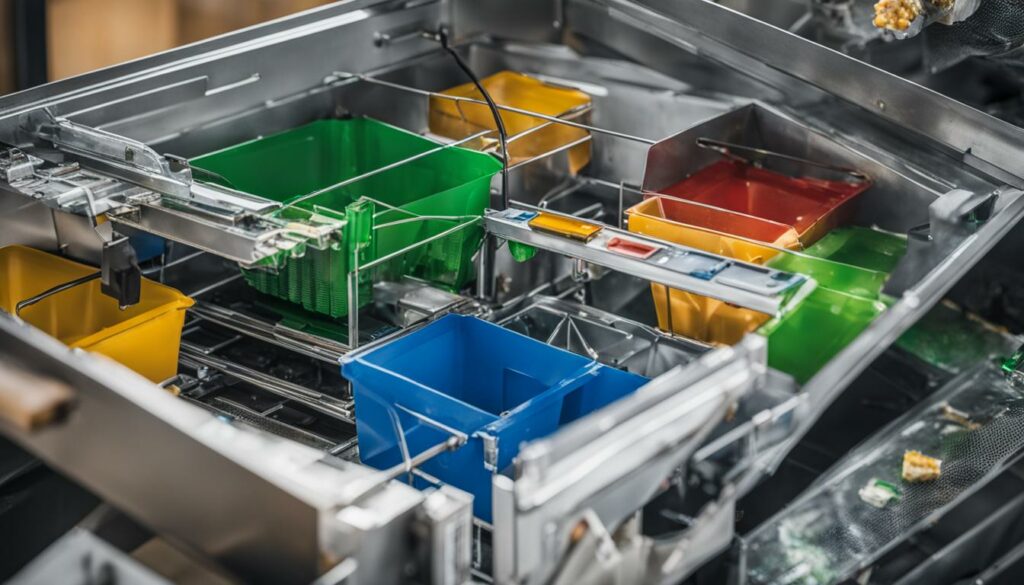
| Steps | Description |
|---|---|
| Waste removal and collection | The servers are collected from different sources, such as businesses, data centers, and individuals, and brought to the recycling facility. |
| Component separation and dismantling | The recycling company separates the various components of the servers, such as hard drives, power supplies, motherboards, and memory modules. These components are then dismantled to extract valuable materials. |
| Data destruction | All data-containing hardware, such as hard drives, are securely wiped or physically destroyed to protect sensitive information before recycling. |
| Material recycling | The extracted materials, such as gold, silver, copper, and aluminum, are processed and recycled for use in the manufacturing of new products. |
Advantages of Server Recycling
Server recycling offers numerous benefits for both businesses and the environment. By choosing to recycle server components, companies can contribute to the reduction of electronic waste and promote a more sustainable IT infrastructure. Here are some key advantages of server recycling:
- Resource Conservation: Recycling server components allows for the retrieval and reuse of valuable materials. This reduces the need for extracting new resources, helping to conserve natural resources and minimize the environmental impact of raw material extraction.
- Environmental Protection: Servers contain toxic chemicals and heavy metals such as cadmium, mercury, and beryllium. If not properly disposed of, these substances can contaminate the environment and pose serious health risks. Server recycling ensures that these hazardous materials are safely handled, preventing pollution and protecting ecosystems.
- Energy Efficiency: Recycling server components consumes significantly less energy compared to manufacturing new equipment from scratch. By reusing existing materials, the energy and resources required for extraction, processing, and manufacturing of new server components are reduced. This contributes to energy conservation and lowers carbon emissions.
- Data Security: Server recycling involves secure data destruction to protect sensitive information. Reputable recycling companies follow strict protocols to ensure the complete removal of data-containing hardware, minimizing the risk of data breaches and safeguarding the confidentiality of business data.
“Server recycling not only benefits the environment but also offers long-term cost savings for businesses. By recycling server components, companies can contribute to a circular economy, reduce their carbon footprint, and demonstrate their commitment to sustainability.”
In conclusion, server recycling is an essential practice for businesses seeking to minimize their environmental impact, conserve resources, and ensure data security. By partnering with reputable recycling companies and prioritizing responsible disposal of server components, businesses can play a significant role in building a greener and more sustainable future.
| Advantages of Server Recycling |
|---|
| Resource Conservation |
| Environmental Protection |
| Energy Efficiency |
| Data Security |
Choosing a Reliable Server Recycling Company
When it comes to server recycling, choosing a reliable and responsible recycling company is essential. By selecting the right partner, you can ensure that your server components are recycled in compliance with environmental regulations and data security protocols. Here are some key factors to consider when making your choice:
Experience and Expertise
Look for a recycling company with years of experience in handling server components. A company that specializes in server recycling will have the necessary expertise and knowledge to safely dismantle and recycle different types of server hardware. They will understand the specific requirements and best practices for handling various server components, ensuring that the recycling process is conducted correctly and efficiently.
Environmental Standards
Choose a recycling company that follows strict environmental standards. Look for certifications such as ISO 14001, which demonstrate their commitment to environmental responsibility. A reputable recycling company will have proper procedures in place to minimize the environmental impact of server recycling. They will ensure that hazardous materials are safely disposed of and that valuable materials are recovered for reuse, reducing the need for extracting new resources.
Data Destruction Protocols
Data security is a critical concern when recycling server components. Ensure that the recycling company follows thorough data destruction protocols. They should have secure processes in place to wipe or physically destroy data-containing hardware, ensuring that your sensitive information is completely removed. It is important to ask for documentation or certificates of data destruction to ensure compliance with data protection regulations.
Convenient Collection Service
Consider the convenience of the collection service provided by the recycling company. Look for a company that offers reliable and efficient pickup services for your old servers. A reputable recycling company will have a dedicated fleet and logistics infrastructure to ensure the safe transportation of server components from your location to their recycling facility. This will save you time and effort in coordinating the disposal of your old servers.
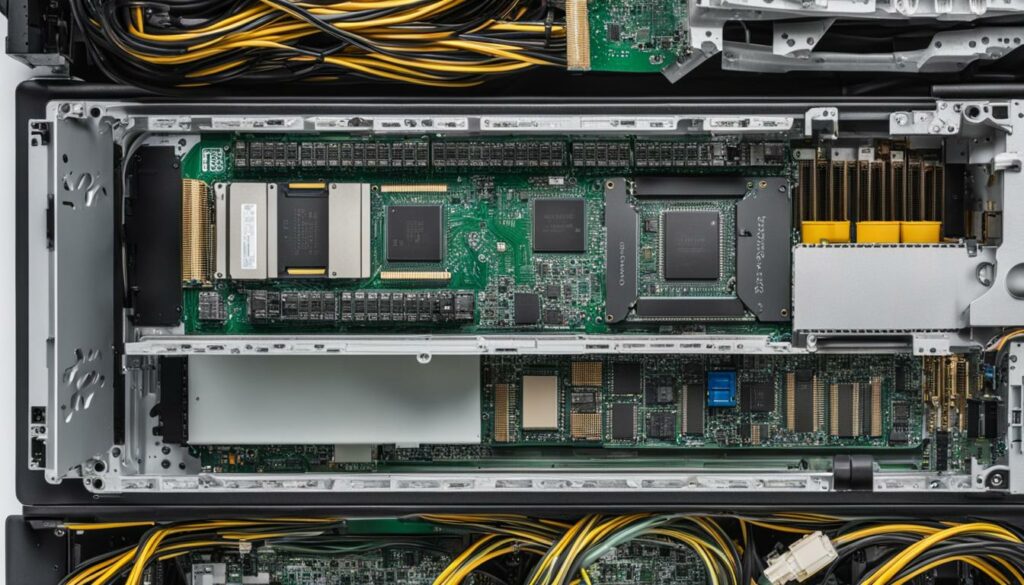
Choosing a reliable server recycling company is crucial for the proper disposal of server components. By considering their experience, environmental standards, data destruction protocols, and collection service, you can ensure that your server components are recycled responsibly and in compliance with regulations. Making the right choice not only protects the environment but also safeguards the security of your data.
The Role of Data Security in Server Recycling
When it comes to recycling server components, data security plays a crucial role. It’s not enough to simply dispose of old servers without properly addressing the sensitive information they contain. Without proper data destruction, businesses run the risk of exposing confidential data and facing potential data breaches. This is why partnering with a reputable recycling company that prioritizes data security is essential.
The process of server recycling involves more than just physically dismantling the hardware. It also involves securely and thoroughly destroying any data-containing components. A reliable recycling company will have strict procedures in place to ensure that all data is completely removed from the recycled servers. This may include techniques such as degaussing, shredding, or wiping the hard drives to prevent any possibility of data recovery.
By prioritizing data security in the server recycling process, businesses can have peace of mind knowing that their confidential information is protected. This not only mitigates the risk of data breaches but also ensures compliance with data protection regulations. Working with a recycling company that follows thorough data destruction procedures is crucial for maintaining the integrity and security of sensitive data throughout the recycling process.
Conclusion
Server recycling is a responsible and sustainable solution for the disposal of old server components. By choosing to recycle server components, businesses can contribute to the reduction of electronic waste and prevent the release of toxic substances into the environment. It is essential to work with a reliable recycling company that follows proper procedures for the dismantling, recycling, and data destruction of server components. By prioritising server recycling, businesses can ensure the security of their data and promote a greener IT infrastructure.
When it comes to server recycling, it is important to understand the benefits it offers. By recycling server components, valuable materials can be recovered and reused, reducing the need for extracting new resources. This not only contributes to a more sustainable IT industry but also helps in conserving energy and reducing carbon emissions. Additionally, server recycling prevents toxic chemicals, such as cadmium and mercury, from polluting the environment, safeguarding our ecosystems and public health.
Choosing a reputable server recycling company is crucial for the successful and secure disposal of server components. Look for a company that has a proven track record in environmental responsibility and follows strict guidelines for server recycling. They should have robust data destruction protocols in place to ensure the complete removal of any sensitive information, protecting your business from potential data breaches. Furthermore, partnering with a reliable recycling company that offers convenient collection services ensures that your old servers are recycled responsibly and in compliance with environmental regulations.
In conclusion, server recycling is not only important for the environment but also for the security of your business. By opting for server recycling, businesses can play their part in reducing electronic waste, conserving resources, and protecting the planet. Make the responsible choice today and contribute to a greener and more sustainable future.
FAQ
What are the recyclable components of a server?
The recyclable components of a server include the chassis, power supply, cooling fans, internal cables, and metal parts.
Can server hard drives be recycled?
Yes, server hard drives can be recycled. However, it is important to ensure that data destruction protocols are followed to securely remove any sensitive information before recycling.
Are server processors recyclable?
Yes, server processors are recyclable. They contain valuable materials such as gold, copper, and silver that can be recovered through the recycling process.
How can I recycle server memory modules?
Server memory modules can be recycled by separating them from the server and sending them to a recycling facility that specializes in electronic waste.
Can server cables and connectors be recycled?
Yes, server cables and connectors can be recycled. They are typically made of metals such as copper and can be processed and reused in the production of new electronic devices.
What should I do with my old server racks?
Old server racks can be recycled by dismantling them and sending the metal components to a recycling facility. It is important to ensure that any remaining electrical components are properly disposed of according to local regulations.
How can I ensure data security when recycling servers?
To ensure data security when recycling servers, it is crucial to work with a recycling company that follows strict data destruction protocols. This ensures that any sensitive information on server hard drives is securely and permanently destroyed before recycling.
Can I recycle servers that are no longer functional?
Yes, you can still recycle servers that are no longer functional. Recycling companies have the expertise to safely handle and dispose of non-functioning server components while adhering to environmental regulations.
Can I recycle servers that are damaged or broken?
Yes, damaged or broken servers can still be recycled. The recycling process involves separating and recovering valuable materials from server components, regardless of their condition.

